Mark Natrass, founder of the Artisan Vinegar Company in Cornwall, England, did not set out to create a line of artisan fruit vinegars, but his passion project for making fruit wines with local berries took a delightful turn!
I recently interviewed Mark about his exciting new fruit and honey vinegar line. He started his career working in beer brewing and is a longtime hobbyist with fermented products, which includes making fruit wine at home. After his Artisan Malt Vinegar (AMV) line took off successfully, Mark began thinking about turning his fruit wine hobby into business. The goal was to do so in a creative way that ventured away from the conventional vinegar making practices. Mark explains that most producers don’t do things the way he does. Instead, most “buy in a large tank of cheap wine vinegar or cider vinegar, chuck a whole load of fruit in, and then infuse them together. My idea was that I would try it by making vinegar from the fruits themselves.” It involved a lot of experimenting initially, especially because trial and error in vinegar making takes so long. “It’s just the nature of the beast,” Mark says. He fiddled about with batches for several years, trying to figure out whether they would work and whether they would taste good. And they did! Then they increased their scale and streamlined their production. He was able to bring his fruit wine hobby into what they routinely do at the Artisan Vinegar Company.
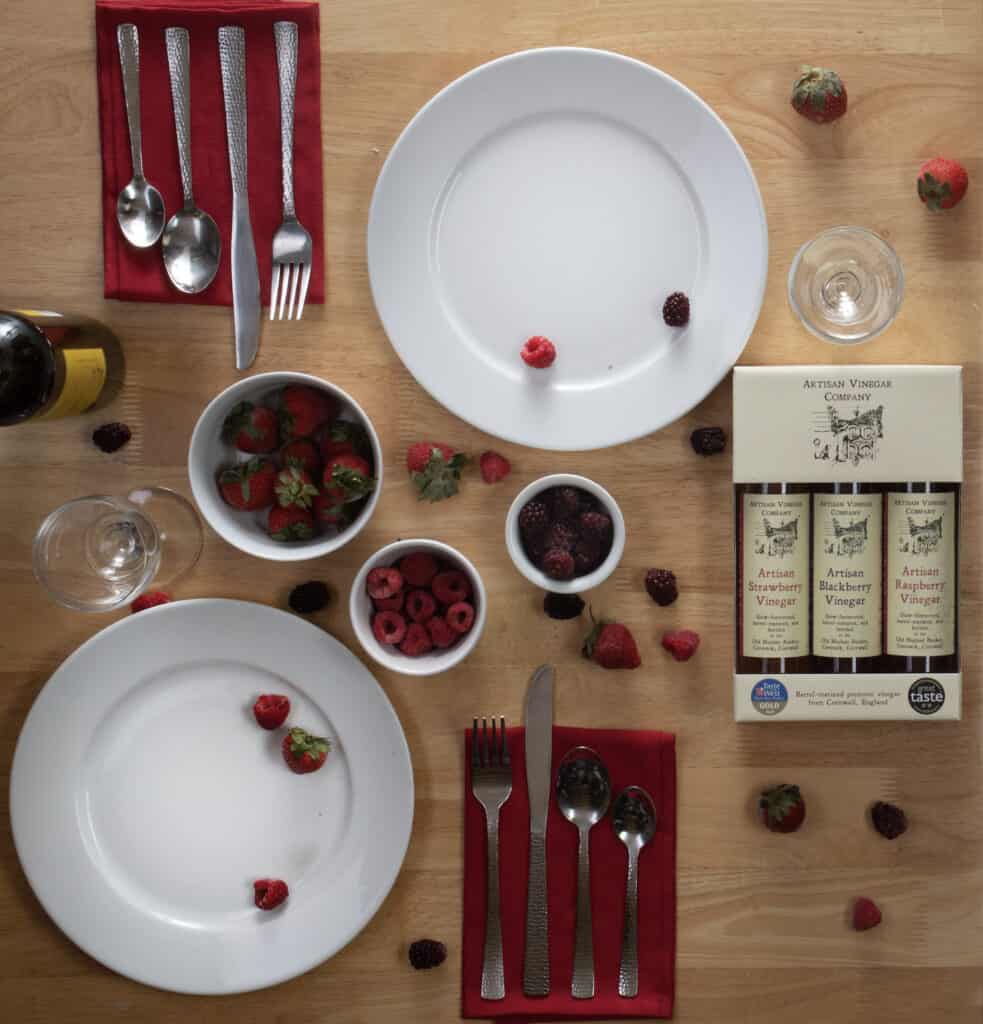
How is artisan fruit vinegar made? It’s the same with most original vinegars: first alcohol is made from fermentation (in this case, wine), and then vinegar is made from the alcohol afterward. AMV has a similar process for the malt vinegar; it’s basic and simple, but also sometimes unpredictable. “We start by getting whole local fruit, mix it with water (and cane sugar if needed), and then ferment it into wine. Then we make vinegar from the wine.” They then add in an acetobacter to the wine; this bacterium turns alcohol molecules into acetic acid molecules. “The simplest analogy I could give to you would be growing a plant. It’s a natural process, so it’s just a matter of figuring out what conditions the plant likes. You give the plant the right conditions and it thrives. It’s the same with acetobacter; we have just worked out an environment that it likes and give it wine to feed on for enough time.”
The ingredients in all these vinegars are only the fruit or honey, water, and sometimes yeast. The one vinegar they add a small amount of natural cane sugar to is the raspberry vinegar. None of these vinegars contain sulfites (most cider producers use sulfites, but Mark realized they didn’t need them at all). Healthy local fruit and time (with no additives) sit for a year in Cornwall to result in exquisite vinegars.
How long does the process take? The first step (winemaking) takes about a couple of months. Then once it’s done and fermented, it takes another few months to turn into vinegar. Mark finds that the finished product can be quite raw and rough early on, so he likes to let it sit in a barrel for another few months. “It gets better if you age it before you sell it,” he says. All in all, the whole process takes about a year.
They use a combination of oak and stainless-steel barrels for aging. Of the oak, some are old Scotch barrels, and others are old American bourbon barrels. Mark says, “Using oak gives a flavor to the vinegars – which suits some varieties but not others. So, we use oak for malt and cider – but the honey and berry vinegars we age in stainless-steel ale firkins.” A firkin is a small cask traditionally used to hold butter, liquid, or fish.
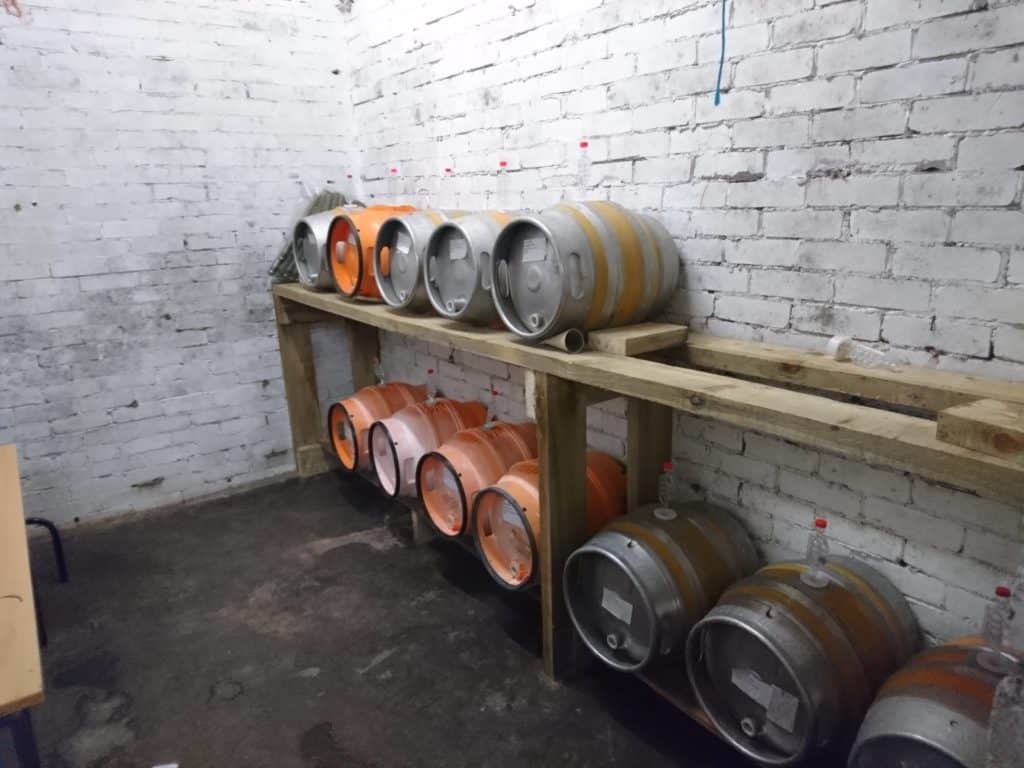
Now let’s talk about the actual fruit! There are six fruit vinegars that Artisan Vinegar Company makes; those encompass the full set. Mark chose these six because they are all native to their part of the world in the U.K. and are fruit they can source locally. Four of these fruits are sourced exclusively from Cornwall, and all six from southwest England. He says they “also have a small land holding of our own where we grow some of the fruit we use. Some of the blackberries, raspberries, nearly all the apples and damsons – come from our own orchards.”
Some of these vinegars have traditional uses and are well known products, and others are way more unique – and Mark guesses that they are the only company in England making these ones! I asked him if he would say he was being creative with these products, and he answered in the affirmative. This creativity and willingness to experiment coupled with his expert fermenting knowledge and techniques has led him to be quite successful in making delightful vinegars that we are excited to introduce to the U.S. market. The team at Rogers Collection was able to taste these vinegars and our notes are below.
Here are the six vinegars in detail:
Strawberry: “We have a big strawberry farm just up the road,” Mark says. He sources all of his strawberries from this farm in Cornwall. These are the earliest harvested batches of vinegar he makes. This vinegar has a ripe jammy aroma, and we think it is the sweetest of the bunch. Great acidity with floral notes, and very interesting.
ARTISAN STRAWBERRY VINEGAR AMV700 6x250mL
Raspberry: This is a popular fruit vinegar in England. Raspberries grow natively, especially up north in Scotland. After selling their first few batches, Mark found that the raspberry vinegar was by far the best seller (among the six) in Britain. He sources the raspberries both from their own in Cornwall, as well as a farm in nearby Herefordshire. We find this one to have a ripe fruity aroma, astringent flavor, and a yeasty finish. Brits widely use raspberry vinegar in salad dressings, for cabbage, for pickling, and for making ceviche – as the fruit in the vinegar goes well with fish.
ARTISAN RASPBERRY VINEGAR AMV600 6x250mL
Blackberry: “Blackberries grow everywhere on the sides of the roads” Mark notes. They originally sourced them from wild foraging, but it was quite laborious, so they switched to buying blackberries from local Cornish farms or farms in nearby Devon (and not skimping on quality). Some of the wild blackberries that grow on their farm still end up in the vinegar too! We find this vinegar to be very smooth – not too dark or distinctly blackberry. It is almost drinkable. Try mixing this with soda water or lemonade to make a summer drink! (In fact, Roman soldiers used to mix red wine vinegar with water as a purifier.)
ARTISAN BLACKBERRY VINEGAR AMV200 6x250mL
Damson and Sloe: Now this is the vinegar combination Americans likely know the least about! We even had to look up the particularities of the plants to understand more about their uses. Damsons and sloes are wild, bitter plums native to England. Damsons are small, black, and sour. Sloes – even smaller (and used to flavor some gins!). They both grow wild in Cornwall and Mark says they get most of the sloes from wild foraging (“before the birds get them”) and the damsons from their own farm. He is not aware of anyone else making a damson vinegar on the market. We think the damson/sloe vinegar has a pleasantly fruity aroma and a yeasty finish. It is unlike anything we have ever tasted. This vinegar is probably their closest to a red wine vinegar, and so can be used similarly. Plums also go well with fish or in Asian cuisine – think stir fries and plum sauces.
ARTISAN DAMSON AND SLOE VINEGAR AMV400 6x250mL
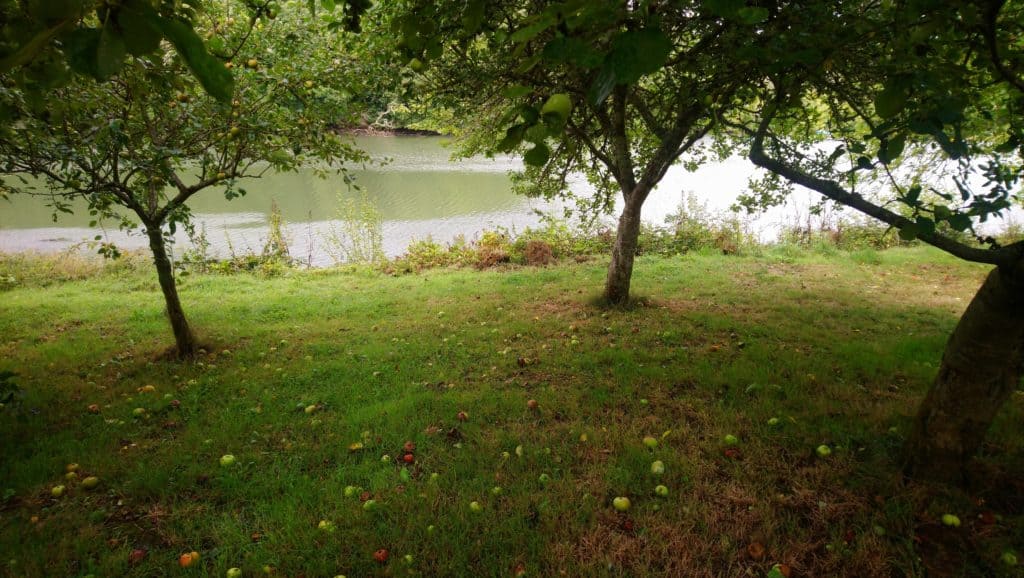
Cider: Now Americans are familiar with this one! Ever used apple cider vinegar for a health remedy? Mark says that although Americans use the word “cider” to mean multiple drinks, in England cider most always means the alcoholic one. Over the years, cider apples have been developed to thrive in southwestern England (a damp and windy climate). The traditional cider apples from Cornwall are too bitter, sour, and tannic to eat. But they give the dry alcoholic cider he ferments a strong apple taste, and those are what he uses for their cider vinegar. “Just local apples from around here. The other thing that is particular about our cider is that we mature it in oak, and so it lends a little darker color,” Mark explains. They source all these apples from Cornwall, and a good portion come from their own farm. We love the aroma, and it smells like the early season of fresh apple harvest. The flavor is intense and sour, but balanced. This vinegar won a Great Taste Award from the Guild of Fine Food in the UK this year.
ARTISAN CIDER VINEGAR AMV300 6x250mL
Mead: Mead (honey wine) is a sacred and traditional regional alcoholic drink in England. They source their honey from a local beekeeper who keeps hives in orchards and wildflower meadows up and down the coastline in Cornwall. In the autumn, she will deliver a load of raw honey (100% from her hives) that Mark begins to make into mead, and then vinegar. “So much better than supermarket honey!” he exclaims. Now, how is making mead different than the other fruit wines, since honey is technically not a fruit, and has a much thicker consistency? Mark says that it is much the same process: “couldn’t be any simpler.” They do not add any sugar since honey is already so sweet. Instead, they mix the honey with warm water, dilute it, and then ferment it. “You would think mead would be really sweet, but it’s not because if you ferment it long enough, all the sugar goes to alcohol. You’re left with the floral stuff from the honey. Which is why it’s so important to use good honey! If you use cheap stuff, all you’re left with is the sugar. Like vodka or something.” Most honey vinegar makers on the market are mixing honey with cider vinegar. Not many people are actually making vinegar from mead. In this way, their mead vinegar is quite revolutionary. And if good honey is used to make that mead, you get amazing floral notes. Mark says that they put a little bit of raw honey back in at the end just to balance it out a touch. Beautiful! We love the acid on the mead honey and can clearly taste wildflower notes on the finish. We would like to try it on a salad or with asparagus. This vinegar also recently won a Great Taste Award from the Guild of Fine Food in the UK this year.
ARTISAN MEAD VINEGAR AMV500 6x250mL
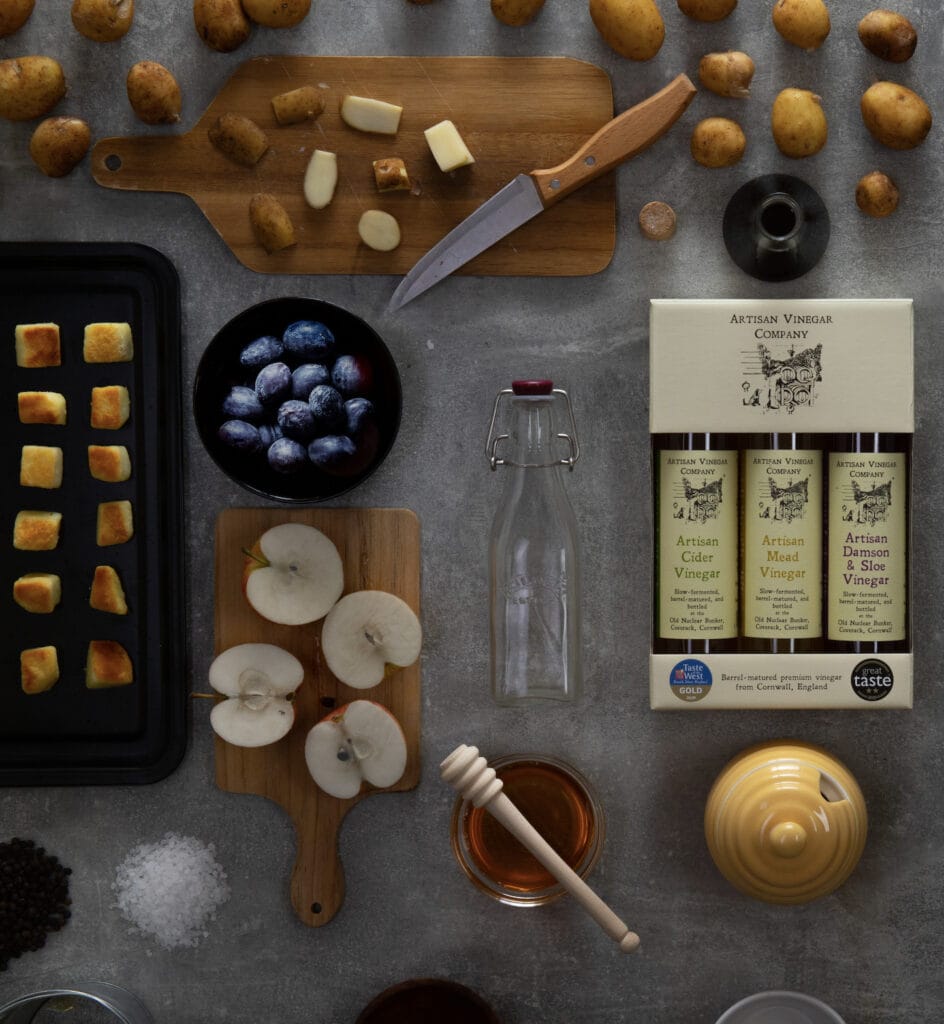
A few more important notes here. All of these vinegars do contain “the mother.” What does that mean?! Mark explains that it is the natural byproduct of the bacteria that turns vinegar into wine and is the strain of what came before – meaning that he puts part of the mother from previous batches into every new batch of vinegar. This process of fermentation is like what you would see in things like sourdough, yogurt, or sauerkraut.
Mark says, “All our vinegars are live, so we prime from batch to batch – adding in live vinegar at the start of each new batch. It is our own culture which has sort of evolved or mutated or developed to thrive in the conditions we provide.”
All their source material for the fruit vinegars arrives during the growing season and with the exception of honey (which has a much longer expiration date), they have to immediately start fermenting. This process mostly begins in the summer into early fall with strawberries being the earliest arrival and damsons the latest (the rest of the year, they make malt vinegar!). The batches are small: they yield about 500-600 liters of fruit vinegar per batch and make 1-5 batches per fruit variety per year.
What sets Mark apart is his willingness to break beyond the mold and make his vinegars in more artisanal way with patience and time. Rogers Collection is excited to import these vinegars born out of a creative idea to preserve the local fruits using artisanal fermentation methods. And because most of them are new and don’t have traditional uses, we can’t wait to see how you will incorporate these flavors into your kitchens!
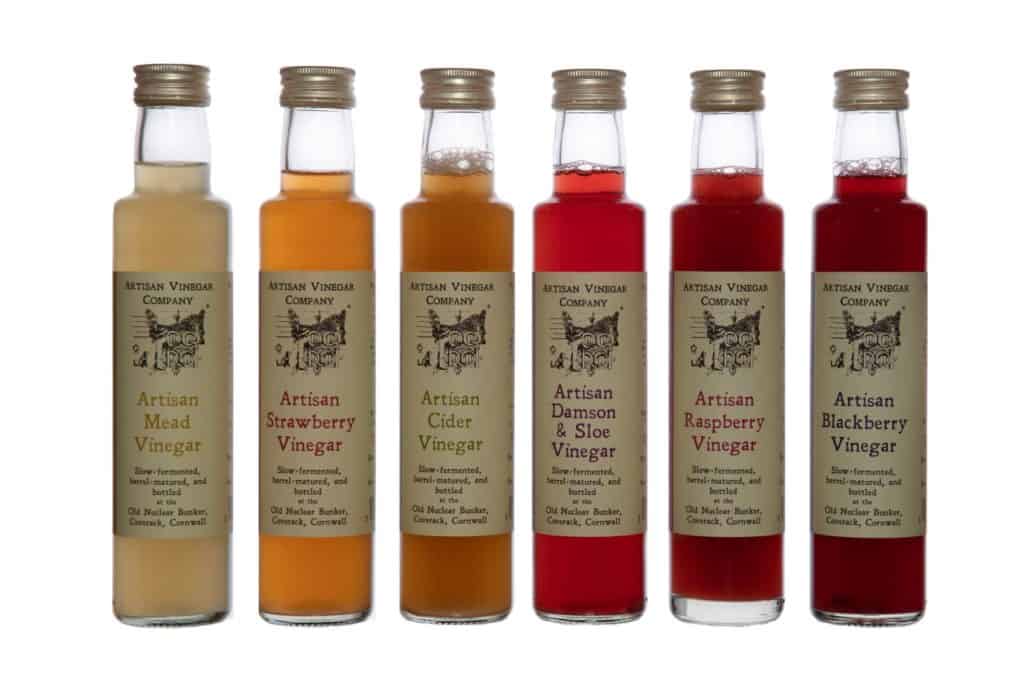
Written by Tess Dunlap